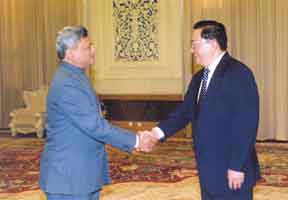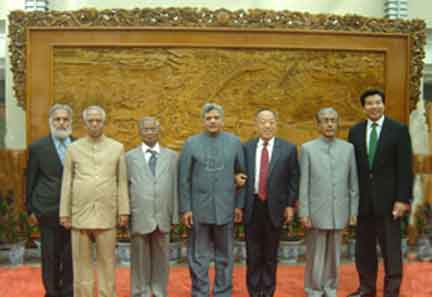 People's Democracy
People's Democracy
(Weekly
Organ of the Communist Party of India (Marxist)
No. 45
November 05, 2006
(Weekly
Organ of the Communist Party of India (Marxist)
|
Vol.
XXX
No. 45 November 05, 2006 |
CPI(M) CC Delegation’s Visit to People’s Republic of China - I
Further Strengthen India-China Relations

Yechury with Luo Gan, member of the Standing Committee of the Polit Bureau of the CPC and in-charge of Internal Security and Law and Order at the Great Hall of the People
Sitaram Yechury
A five-member central committee delegation headed by Sitaram Yechury had visited China at the invitation of the International Department of the Central Committee of the Communist Party of China (CPC) from October 16 to 24, 2006. The other members of the delegation included Polit Bureau member Manik Sarkar, central committee members Mohd Amin, P Ramaiah and Kumar Shiralkar.
Apart from political discussions in Beijing with the leadership of the CPC, the delegation visited Tian Jin in the North, Guiyang (capital of Guizhou province) in the South West and Shanghai and Pudong. This choice was on the request of the CPI(M) to visit a developed area (Shanghai), a developing area (Tian Jin) and a backward area (Guiyang). The per capita income in Guiyang province is ten times lower than the per capita income in Shanghai! Notwithstanding this, the province in general and Guiyang in particular appeared fairly well developed.
At all these places, the delegation was warmly received by the highest levels of the Party and the governmental leadership. The delegation visited some industrial units as well as villages to see in practice how the Chinese rural economy is doing. The delegation had a rich experience of the process of socialist construction in China and the associated problems that have emerged during the reform process and the manner in which the CPC is tackling these.
The following series of articles is based on the impressions that the delegation learnt during this visit.
THE visit of this CPI(M) central committee delegation to China comes barely a month ahead of the State visit of the president of the Peoples Republic of China (PRC) and the general secretary of the Communist Party of China Hu Jintao to India. While there is a great deal of expectation in India regarding this visit, there was a similar air of expectation amongst the Chinese leadership as well. The first official meeting of the delegation was with the foreign minister of PRC Li Zhaoxing. This was unprecedented in the sense that normally Party level delegations meet Party leaders (who may also happen to be government leaders). During the course of discussions, the foreign minister emphasised that the visit of this delegation will further enrich mutual political trust between India and China. Towards this end, he informed that China would be working hard and they consider the visit of Hu Jintao as a very important development in this regard. Referring to the border dispute as a legacy left behind by history, he said China was prepared to work patiently to arrive at a mutually acceptable solution. In the meanwhile, relations in all other areas must be further improved particularly economic cooperation.
In fact, at all levels, there was a pointed reference for improving the economic relations between India and China. The Chinese feel that with both the economies growing, India’s relative advantage in information technology software and China’s relative advantage in manufacturing hardware must be combined to produce a new synergy. The CPI(M), on its part, extended an invitation for Chinese enterprises to come to India, particularly to West Bengal, Kerala and Tripura which are presently ruled by CPI(M)-led coalitions.
The highlight of the meetings in Beijing was when the CPI(M) delegation was received by Luo Gan, member of the Standing Committee of the Polit Bureau of the CPC and in-charge of Internal Security and Law and Order at the Great Hall of the People. Welcoming the CPI(M) delegation, Luo Gan expressed confidence that the visit will help to improve bilateral relations between the two parties, the peoples and the countries. He displayed a remarkable knowledge of the current Indian political situation and the role being played by the CPI(M). Recalling that 2006 is the Indo-China friendship year, this visit of the CPI(M) delegation, he said, was an important contribution. India and China, he said, had historical bonds going back to millennia and in the present circumstances there are immense opportunities to strengthen these bonds. He said China and India share the common appreciation for peace and democracy in international relations. Both the countries have together contributed to international relations through the panchsheel.
He further briefed the delegation on the latest decisions of the CPC central committee which has adopted a detailed resolution on the practice of building a harmonious socialist society. The CPC’s conception of socialism with Chinese characteristics has always kept the people as its central priority and, therefore, working for their prosperity is its primary task. Currently, enormous changes and rapid economic structural changes are taking place in China. The overall living standards of the Chinese people have markedly increased in recent years. At the same time, certain contradictions are also arising. Unequal distribution leading to income inequalities exist. There are also inequalities in incomes between the rural and urban workers. There are also problems of corruption. The CPC’s priority is to remove such inequalities and build a harmonious society (more on this later.)
In fact, through all discussions, the CPC’s appreciation of the international situation was marked by an assessment that the main issue concerns peace and development under the framework of international organisations. The natural tendency in global development, they say, is towards multilateralism. However, unilateralism pursued by USA which seeks global domination is a major problem. The military attacks and interference in international affairs need to be checked and balanced by other powers. The main issue in international relations is the struggle between multilateralism and unilateralism. Our delegation expressed the hope that China, in future, would be more forthcoming in opposing unilateralism in order to strengthen multilateralism.

CPI(M) delegation with the foreign minister of PRC Li Zhaoxing in Beijing
THE LONG MARCH SPIRIT
During the two days that we spent in Beijing, the media was full of news on two issues – one was the celebrations of the 70th anniversary of the Long March and the other was on the campaign against corruption.
On October 22, 1936, the Long March ended in extreme North West China at Jiangtalbao. At a grand ceremony held in Beijing, Hu Jintao recalling the valour and determination of the Red Army said that, “The Long March which laid the foundation for revolution and paved the way for new China, is a matter of great pride for the nation”. The Long March was a historic military manoeuvre conducted by the Red Army under the leadership of the CPC, covering a distance of 12,500 kilometers and liberating village after village on its way. At the end of the Long March, the new CPC headquarters was established at Yunan from where the struggle for the final liberation was conducted. The aim of the ceremony to mark its 70th anniversary was, according to Hu Jintao, to encourage the party, the army and the people to “advance valiantly along the socialist road with Chinese characteristics”.
President Hu Jintao compared the latest decision of the CPC central committee for building of a harmonious socialist society to a new Long March the party has now started. He emphasised that the CPC must stick to this Long March spirit to achieve this goal.
The China Daily editorially commented that: “It is not easy for government officials to stick to that spirit in this affluent and pluralistic society. Temptations of various kinds threaten to erode the will of those in power. The fight against corruption has a critical bearing on the fate of the party and the successful building of a harmonious society.
“However there lies the paradox: the more difficult it is for those in power to stick to the Long March spirit, the more necessary it becomes for them to have it as their core values.
“This spirit should constitute the very basis of the personal ethics for government leaders and officials at various levels.
“Only with this spirit, soaked in the blood of our Long March heroes, and underlined by the government’s code of conduct, will they be able to intentionally behave themselves on their posts.
“The 70th anniversary of Long March is intended to be a lesson for our government leaders and officials, to be filled with the Long March spirit of putting the entire nation before themselves.”
CAMPAIGN AGAINST CORRUPTION
This campaign against corruption has reached a very serious stage in China. The party chief of the powerful Shanghai unit of the CPC was recently stripped of all his party positions, including removal from the Standing Committee of the Polit Bureau on charges related to corruption. According to official figures, more than 67,500 government functionaries have been punished on corruption charges since 2003. Nearly 18,000 in the first eight months of this year. The control and elimination of corruption is considered by the CPC as one of the priority tasks to ensure the Rule of the Law and eliminate the consequential effects this has on crime and terrorism. China is now grappling with the fact that in order to avoid investigations, those facing corruption charges are leaving to foreign countries. Newspapers published records of more than 500 people suspected of serious economic crimes are leaving for foreign countries. The money involved in these cases alone is up to 70 billion yuan ($8.75 billion).
(To be continued)